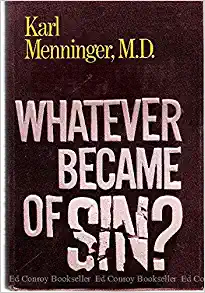Responsible.
(The continuation of the Biblical Anthropology series.)

We met Psychiatrist Karl Menninger in the post Does Sin Even Exist?. Dr. Menninger’s answer, in his 1930 book, was basically, “Of course not, don’t be silly.”
But his opinion changed.
Over 40 years after his interview, where he tried to understand mental illness while denying the reality of sin, he admitted he had been wrong. In fact, he wrote a book titled Whatever Became of Sin?. And now he said, yes, sin exists. In fact, it is the very root of mental illness. You simply can’t deny it. We are responsible for our sin, and responsible to change.
This is what he wrote at the end of his book:
If we believe in sin—as I do—we believe in our personal responsibility for trying to correct it, and thereby saving ourselves and our world.
Dr. Karl Menninger
Using the simple terminology of Dr. Menninger, we are responsible.
In the last post I had a little box with some of the ways we justify our sin. Don’t miss it. One of the arguments was this: “Sin is something apart from the ‘real me’, the ‘authentic me’.” But the Bible teaches that the “authentic me” (without Christ) is actually evil. That’s hard for anyone to swallow.
But this is the reality: We are responsible for our sin. We are responsible to change.
But Dr. Menninger didn’t seem to understand that simply trying to change will never lead to salvation, not of ourselves, nor of the world.
Trying to change never leads to salvation.
We talked about Aleksandr Solzhenitsyn right at the beginning of this section. In his book The Gulag Archipelago, he documents some of the incredible injustices of the Soviet Union. Reading it, one finds it hard to even believe that men and women are even capable of such evil. And how is it that these things are still happening in the world today? And yes, they are still happening in the world today.
Why is there so much evil in the world, and how can we stop it? It happens in wars and persecution and in our own homes.
Perhaps we need more education. And yet, the modern education in Nazi Germany didn’t seem to solve the problem. What if we eliminate need and poverty? Well, do we believe that the rich do no evil? That “equals” never sin against one another?
Well, what if we could simply eliminate the evil people? Communist societies and others have tried to do just that.
But in his book, Solzhenitsyn writes about the tyranny of the “blue caps”, that is the KGB, the secret police. And he asks this terrifying question. If my circumstances had been different, would I have become one of those men? It’s possible. Even probable. And he concludes with this:
If only it were all so simple. If only there were evil people somewhere, insidiously committing evil deeds, and it were necessary only to separate them from the rest of us, and destroy them. But the line dividing good and evil cuts through the heart of every human being. And who is willing to destroy a piece of his own heart.
Aleksandr Solzhenitsyn (The Gulag Archipelago 1918-1956)
This is a difficult topic. But as Christians, we know that there is grace, forgiveness, and hope in Jesus Christ. But … only in Jesus Christ. Christ or chaos.
And there is salvation in no one else, for there is no other name under heaven given among men by which we must be saved.
Acts 4:12
That is, the name of Jesus of Nazareth.
We must stop trusting in our own actions, our own goodness, because there is no salvation in my name or yours. There is only salvation in the name of Jesus of Nazareth. And when we put our full confidence – our true faith – in Him, we find salvation, because He is the only Saviour.
We follow Him as Saviour, we honour Him as Lord in our hearts, because we know that the only other option is chaos.
Resources
This is the end of the second section. I only have one resource for you this time – one for kids. For a great re-telling of the story of Adam and Eve, check out Mrs. G’s “Adam and Eve”, available for download in mp3 format. As we continue, it’s so important to think deeply about the early chapters of Genesis.
